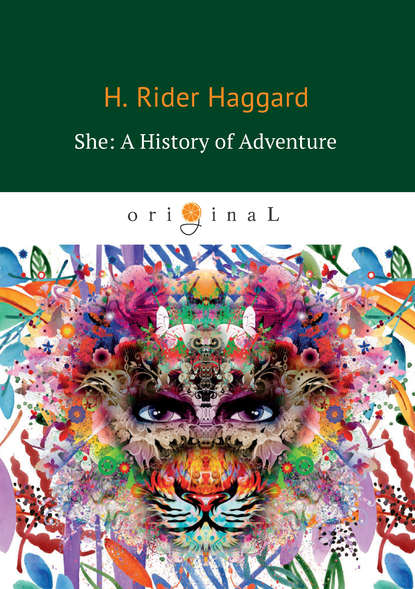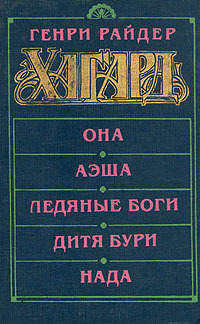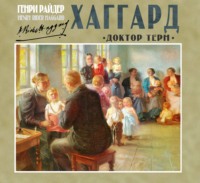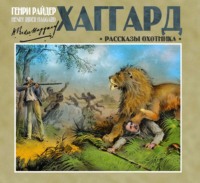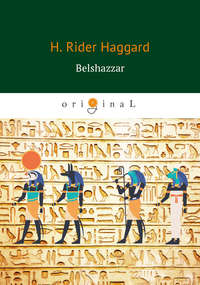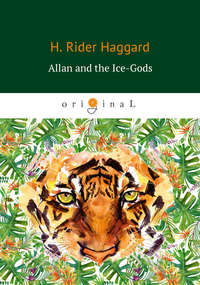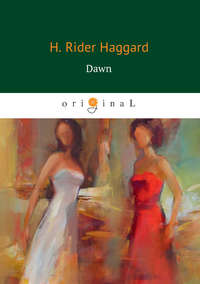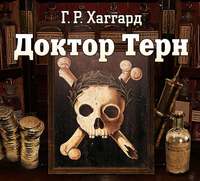
Полная версия
Ayesha: The Return of She
“Are you mad?” I asked. “How can we camp on that place?”
“I don’t know, but I am going. I must go, Horace.”
“Which means that we both must go. But how about the yak?”
“Where we can climb, it can follow,” he answered.
So we strapped the tent and other baggage, including a good supply of cooked meat, upon the beast’s back, and started. The tramp was long since we were obliged to make some detours to avoid slopes of frozen snow in which, on our previous ascents, we had cut footholds with an axe, for up these the laden animal could not clamber. Reaching the summit at length, we dug a hole, and there pitched the tent, piling the excavated snow about its sides. By this time it began to grow dark, and having descended into the tent, yak and all, we ate our food and waited.
Oh! what cold was that. The frost was fearful, and at this height a wind blew whose icy breath passed through all our wrappings, and seemed to burn our flesh beneath as though with hot irons. It was fortunate that we had brought the yak, for without the warmth from its shaggy body I believe that we should have perished, even in our tent. For some hours we watched, as indeed we must, since to sleep might mean to die, yet saw nothing save the lonely stars, and heard nothing in that awful silence, for here even the wind made no noise as it slid across the snows. Accustomed as I was to such exposure, my faculties began to grow numb and my eyes to shut, when suddenly Leo said —
“Look, below the red star!”
I looked, and there high in the sky was the same curious glow which we had seen upon the previous night. There was more than this indeed, for beneath it, almost on a line with us and just above the crests of the intervening peaks, appeared a faint sheet of fire and revealed against it, something black. Whilst we watched, the fire widened, spread upwards and grew in power and intensity. Now against its flaming background the black object became clearly visible, and lo! it was the top of a soaring pillar surmounted by a loop. Yes, we could see its every outline. It was the crux ansata, the Symbol of Life itself.
The symbol vanished, the fire sank. Again it blazed up more fiercely than before and the loop appeared afresh, then once more disappeared. A third time the fire shone, and with such intensity, that no lightning could surpass its brilliance. All around the heavens were lit up, and, through the black needle-shaped eye of the symbol, as from the flare of a beacon, or the search-light of a ship, one fierce ray shot across the sea of mountain tops and the spaces of the desert, straight as an arrow to the lofty peak on which we lay. Yes, it lit upon the snow, staining it red, and upon the wild, white faces of us who watched, though to the right and left of us spread thick darkness. My compass lay before me on the snow, and I could even see its needle; and beyond us the shape of a white fox that had crept near, scenting food. Then it was gone as swiftly as it came. Gone too were the symbol and the veil of flame behind it, only the glow lingered a little on the distant sky.
For awhile there was silence between us, then Leo said —
“Do you remember, Horace, when we lay upon the Rocking Stone where her cloak fell upon me – ” as he said the words the breath caught in his throat – ”how the ray of light was sent to us in farewell, and to show us a path of escape from the Place of Death? Now I think that it has been sent again in greeting to point out the path to the Place of Life where Ayesha dwells, whom we have lost awhile.”
“It may be so,” I answered shortly, for the matter was beyond speech or argument, beyond wonder even. But I knew then, as I know now that we were players in some mighty, predestined drama; that our parts were written and we must speak them, as our path was prepared and we must tread it to the end unknown. Fear and doubt were left behind, hope was sunk in certainty; the foreshadowing visions of the night had found an actual fulfilment and the pitiful seed of the promise of her who died, growing unseen through all the cruel, empty years, had come to harvest.
No, we feared no more, not even when with the dawn rose the roaring wind, through which we struggled down the mountain slopes, as it would seem in peril of our lives at every step; not even as hour by hour we fought our way onwards through the whirling snow-storm, that made us deaf and blind. For we knew that those lives were charmed. We could not see or hear, yet we were led. Clinging to the yak, we struggled downward and homewards, till at length out of the turmoil and the gloom its instinct brought us unharmed to the door of the monastery, where the old abbot embraced us in his joy, and the monks put up prayers of thanks. For they were sure that we must be dead. Through such a storm, they said, no man had ever lived before.
It was still mid-winter, and oh! the awful weariness of those months of waiting. In our hands was the key, yonder amongst those mountains lay the door, but not yet might we set that key within its lock. For between us and these stretched the great desert, where the snow rolled like billows, and until that snow melted we dared not attempt its passage. So we sat in the monastery, and schooled our hearts to patience.
Still even to these frozen wilds of Central Asia spring comes at last. One evening the air felt warm, and that night there were only a few degrees of frost. The next the clouds banked up, and in the morning not snow was falling from them, but rain, and we found the old monks preparing their instruments of husbandry, as they said that the season of sowing was at hand. For three days it rained, while the snows melted before our eyes. On the fourth torrents of water were rushing down the mountain and the desert was once more brown and bare, though not for long, for within another week it was carpeted with flowers. Then we knew that the time had come to start.
“But whither go you? Whither go you?” asked the old abbot in dismay. “Are you not happy here? Do you not make great strides along the Path, as may be known by your pious conversation? Is not everything that we have your own? Oh! why would you leave us?”
“We are wanderers,” we answered, “and when we see mountains in front of us we must cross them.”
Kou-en looked at us shrewdly, then asked —
“What do you seek beyond the mountains? And, my brethren, what merit is gathered by hiding the truth from an old man, for such concealments are separated from falsehoods but by the length of a single barleycorn. Tell me, that at least my prayers may accompany you.”
“Holy abbot,” I said, “awhile ago yonder in the library you made a certain confession to us.”
“Oh! remind me not of it,” he said, holding up his hands. “Why do you wish to torment me?”
“Far be the thought from us, most kind friend and virtuous man,” I answered. “But, as it chances, your story is very much our own, and we think that we have experience of this same priestess.”
“Speak on,” he said, much interested.
So I told him the outlines of our tale; for an hour or more I told it while he sat opposite to us swaying his head like a tortoise and saying nothing. At length it was done.
“Now,” I added, “let the lamp of your wisdom shine upon our darkness. Do you not find this story wondrous, or do you perchance think that we are liars?”
“Brethren of the great monastery called the World,” Kou-en answered with his customary chuckle, “why should I think you liars who, from the moment my eyes fell upon you, knew you to be true men? Moreover, why should I hold this tale so very wondrous? You have but stumbled upon the fringe of a truth with which we have been acquainted for many, many ages.
“Because in a vision she showed you this monastery, and led you to a spot beyond the mountains where she vanished, you hope that this woman whom you saw die is re-incarnated yonder. Why not? In this there is nothing impossible to those who are instructed in the truth, though the lengthening of her last life was strange and contrary to experience. Doubtless you will find her there as you expect, and doubtless her khama, or identity, is the same as that which in some earlier life of hers once brought me to sin.
“Only be not mistaken, she is no immortal; nothing is immortal. She is but a being held back by her own pride, her own greatness if you will, upon the path towards Nirvana. That pride will be humbled, as already it has been humbled; that brow of majesty shall be sprinkled with the dust of change and death, that sinful spirit must be purified by sorrows and by separations. Brother Leo, if you win her, it will be but to lose, and then the ladder must be reclimbed. Brother Holly, for you as for me loss is our only gain, since thereby we are spared much woe. Oh! bide here and pray with me. Why dash yourselves against a rock? Why labour to pour water into a broken jar whence it must sink into the sands of profitless experience, and there be wasted, whilst you remain athirst?”
“Water makes the sand fertile,” I answered. “Where water falls, life comes, and sorrow is the seed of joy.”
“Love is the law of life,” broke in Leo; “without love there is no life. I seek love that I may live. I believe that all these things are ordained to an end which we do not know. Fate draws me on – I fulfil my fate – ”
“And do but delay your freedom. Yet I will not argue with you, brother, who must follow your own road. See now, what has this woman, this priestess of a false faith if she be so still, brought you in the past? Once in another life, or so I understand your story, you were sworn to a certain nature-goddess, who was named Isis, were you not, and to her alone? Then a woman tempted you, and you fled with her afar. And there what found you? The betrayed and avenging goddess who slew you, or if not the goddess, one who had drunk of her wisdom and was the minister of her vengeance. Having that wisdom this minister – woman or evil spirit – refused to die because she had learned to love you, but waited knowing that in your next life she would find you again, as indeed she would have done more swiftly in Devachan had she died without living on alone in so much misery. And she found you, and she died, or seemed to die, and now she is re-born, as she must be, and doubtless you will meet once more, and again there must come misery. Oh! my friends, go not across the mountains; bide here with me and lament your sins.”
“Nay,” answered Leo, “we are sworn to a tryst, and we do not break our word.”
“Then, brethren, go keep your tryst, and when you have reaped its harvest think upon my sayings, for I am sure that the wine you crush from the vintage of your desire will run red like blood, and that in its drinking you shall find neither forgetfulness nor peace. Made blind by a passion of which well I know the sting and power, you seek to add a fair-faced evil to your lives, thinking that from this unity there shall be born all knowledge and great joy.
“Rather should you desire to live alone in holiness until at length your separate lives are merged and lost in the Good Unspeakable, the eternal bliss that lies in the last Nothingness. Ah! you do not believe me now; you shake your heads and smile; yet a day will dawn, it may be after many incarnations, when you shall bow them in the dust and weep, saying to me, ‘Brother Kou-en, yours were the words of wisdom, ours the deeds of foolishness;’” and with a deep sigh the old man turned and left us.
“A cheerful faith, truly,” said Leo, looking after him, “to dwell through aeons in monotonous misery in order that consciousness may be swallowed up at last in some void and formless abstraction called the ‘Utter Peace.’ I would rather take my share of a bad world and keep my hope of a better. Also I do not think that he knows anything of Ayesha and her destiny.”
“So would I,” I answered, “though perhaps he is right after all. Who can tell? Moreover, what is the use of reasoning? Leo, we have no choice; we follow our fate. To what that fate may lead us we shall learn in due season.”
Then we went to rest, for it was late, though I found little sleep that night. The warnings of the ancient abbot, good and learned man as he was, full also of ripe experience and of the foresighted wisdom that is given to such as he, oppressed me deeply. He promised us sorrow and bloodshed beyond the mountains, ending in death and rebirths full of misery. Well, it might be so, but no approaching sufferings could stay our feet. And even if they could, they should not, since to see her face again I was ready to brave them all. And if this was my case what must be that of Leo!
A strange theory that of Kou-en’s, that Ayesha was the goddess in old Egypt to whom Kallikrates was priest, or at the least her representative. That the royal Amenartas, with whom he fled, seduced him from the goddess to whom he was sworn. That this goddess incarnate in Ayesha – or using the woman Ayesha and her passions as her instruments – was avenged upon them both at Kôr, and that there in an after age the bolt she shot fell back upon her own head.
Well, I had often thought as much myself. Only I was sure that She herself could be no actual divinity, though she might be a manifestation of one, a priestess, a messenger, charged to work its will, to avenge or to reward, and yet herself a human soul, with hopes and passions to be satisfied, and a destiny to fulfil. In truth, writing now, when all is past and done with, I find much to confirm me in, and little to turn me from that theory, since life and powers of a quality which are more than human do not alone suffice to make a soul divine. On the other hand, however, it must be borne in mind that on one occasion at any rate, Ayesha did undoubtedly suggest that in the beginning she was “a daughter of Heaven,” and that there were others, notably the old Shaman Simbri, who seemed to take it for granted that her origin was supernatural. But of all these things I hope to speak in their season.
Meanwhile what lay beyond the mountains? Should we find her there who held the sceptre and upon earth wielded the power of the outraged Isis, and with her, that other woman who wrought the wrong? And if so, would the dread, inhuman struggle reach its climax around the person of the sinful priest? In a few months, a few days even, we might begin to know.
Thrilled by this thought at length I fell asleep.
Chapter 4
The Avalanche
On the morning of the second day from that night the sunrise found us already on our path across the desert. There, nearly a mile behind us, we could see the ruined statue of Buddha seated in front of the ancient monastery, and in that clear atmosphere could even distinguish the bent form of our friend, the old abbot, Kou-en, leaning against it until we were quite lost to sight. All the monks had wept when we parted from them, and Kou-en even more bitterly than the rest, for he had learned to love us.
“I am grieved,” he said, “much grieved, which indeed I should not be, for such emotion partakes of sin. Yet I find comfort, for I know well that although I must soon leave this present life, yet we shall meet again in many future incarnations, and after you have put away these follies, together tread the path to perfect peace. Now take with you my blessings and my prayers and begone, forgetting not that should you live to return” – and he shook his head, doubtfully – ”here you will be ever welcome.”
So we embraced him and went sorrowfully.
It will be remembered that when the mysterious light fell upon us on the peak I had my compass with me and was able roughly to take its bearings. For lack of any better guide we now followed these bearings, travelling almost due north-east, for in that direction had shone the fire. All day in the most beautiful weather we marched across the flower-strewn desert, seeing nothing except bunches of game and one or two herds of wild asses which had come down from the mountains to feed upon the new grass. As evening approached we shot an antelope and made our camp – for we had brought the yak and a tent with us – among some tamarisk scrub, of which the dry stems furnished us with fuel. Nor did we lack for water, since by scraping in the sand soaked with melted snow, we found plenty of fair quality. So that night we supped in luxury upon tea and antelope meat, which indeed we were glad to have, as it spared our little store of dried provisions.
The next morning we ascertained our position as well as we could, and estimated that we had crossed about a quarter of the desert, a guess which proved very accurate, for on the evening of the fourth day of our journey we reached the bottom slopes of the opposing mountains, without having experienced either accident or fatigue. As Leo said, things were “going like clockwork,” but I reminded him that a good start often meant a bad finish. Nor was I wrong, for now came our hardships. To begin with, the mountains proved to be exceeding high; it took us two days to climb their lower slopes. Also the heat of the sun had softened the snow, which made walking through it laborious, whilst, accustomed though we were to such conditions through long years of travelling, its continual glitter affected our eyes.
The morning of the seventh day found us in the mouth of a defile which wound away into the heart of the mountains. As it seemed the only possible path, we followed it, and were much cheered to discover that here must once have run a road. Not that we could see any road, indeed, for everything was buried in snow. But that one lay beneath our feet we were certain, since, although we marched along the edge of precipices, our path, however steep, was always flat; moreover, the rock upon one side of it had often been scarped by the hand of man. Of this there could be no doubt, for as the snow did not cling here, we saw the tool marks upon its bare surface.
Also we came to several places where galleries had been built out from the mountain side, by means of beams let into it, as is still a common practice in Tibet. These beams of course had long since rotted away, leaving a gulf between us and the continuation of the path. When we met with such gaps we were forced to go back and make a detour round or over some mountain; but although much delayed thereby, as it happened, we always managed to regain the road, if not without difficulty and danger.
What tried us more – for here our skill and experience as mountaineers could not help us – was the cold at night, obliged as we were to camp in the severe frost at a great altitude, and to endure through the long hours of darkness penetrating and icy winds, which soughed ceaselessly down the pass.
At length on the tenth day we reached the end of the defile, and as night was falling, camped there in the most bitter cold. Those were miserable hours, for now we had no fuel with which to boil water, and must satisfy our thirst by eating frozen snow, while our eyes smarted so sorely that we could not sleep, and notwithstanding all our wraps and the warmth that we gathered from the yak in the little tent, the cold caused our teeth to chatter like castanets.
The dawn came, and, after it, the sunrise. We crept from the tent, and leaving it standing awhile, dragged our stiffened limbs a hundred yards or so to a spot where the defile took a turn, in order that we might thaw in the rays of the sun, which at that hour could not reach us where we had camped.
Leo was round it first, and I heard him utter an exclamation. In a few seconds I reached his side, and lo! before us lay our Promised Land.
Far beneath us, ten thousand feet at least – for it must be remembered that we viewed it from the top of a mountain – it stretched away and away till its distances met the horizon. In character it was quite flat, an alluvial plain that probably, in some primeval age, had been the bottom of one of the vast lakes of which a number exist in Central Asia, most of them now in process of desiccation. One object only relieved this dreary flatness, a single, snow-clad, and gigantic mountain, of which even at that distance – for it was very far from us – we could clearly see the outline. Indeed we could see more, for from its rounded crest rose a great plume of smoke, showing that it was an active volcano, and on the hither lip of the crater an enormous pillar of rock, whereof the top was formed to the shape of a loop.
Yes, there it stood before us, that symbol of our vision which we had sought these many years, and at the sight of it our hearts beat fast and our breath came quickly. We noted at once that although we had not seen it during our passage of the mountains, since the peaks ahead and the rocky sides of the defile hid it from view, so great was its height that it overtopped the tallest of them. This made it clear to us how it came to be possible that the ray of light passing through the loop could fall upon the highest snows of that towering pinnacle which we had climbed upon the further side of the desert.
Also now we were certain of the cause of that ray, for the smoke behind the loop explained this mystery. Doubtless, at times when the volcano was awake, that smoke must be replaced by flame, emitting light of fearful intensity, and this light it was that reached us, concentrated and directed by the loop.
For the rest we thought that about thirty miles away we could make out a white-roofed town set upon a mound, situated among trees upon the banks of a wide river, which flowed across the plain. Also it was evident that this country had a large population who cultivated the soil, for by the aid of a pair of field glasses, one of our few remaining and most cherished possessions, we could see the green of springing crops pierced by irrigation canals and the lines of trees that marked the limits of the fields.
Yes, there before us stretched the Promised Land, and there rose the mystic Mount, so that all we had to do was to march down the snow slopes and enter it where we would.
Thus we thought in our folly, little guessing what lay before us, what terrors and weary suffering we must endure before we stood at length beneath the shadow of the Symbol of Life.
Our fatigues forgotten, we returned to the tent, hastily swallowed some of our dried food, which we washed down with lumps of snow that gave us toothache and chilled us inside, but which thirst compelled us to eat, dragged the poor yak to its feet, loaded it up, and started.
All this while, so great was our haste and so occupied were each of us with our own thoughts that, if my memory serves me, we scarcely interchanged a word. Down the snow slopes we marched swiftly and without hesitation, for here the road was marked for us by means of pillars of rock set opposite to one another at intervals. These pillars we observed with satisfaction, for they told us that we were still upon a highway which led to the Promised Land.
Yet, as we could not help noting, it was one which seemed to have gone out of use, since with the exception of a few wild-sheep tracks and the spoor of some bears and mountain foxes, not a single sign of beast or man could we discover. This, however, was to be explained, we reflected, by the fact that doubtless the road was only used in the summer season. Or perhaps the inhabitants of the country were now stay-at-home people who never travelled it at all.
Those slopes were longer than we thought; indeed, when darkness closed in we had not reached the foot of them. So we were obliged to spend another night in the snow, pitching our tent in the shelter of an over-hanging rock. As we had descended many thousand feet, the temperature proved, fortunately, a little milder; indeed, I do not think that there were more than eighteen or twenty degrees of frost that night. Also here and there the heat of the sun had melted the snow in secluded places, so that we were able to find water to drink, while the yak could fill its poor old stomach with dead-looking mountain mosses, which it seemed to think better than nothing.
Again, the still dawn came, throwing its red garment over the lonesome, endless mountains, and we dragged ourselves to our numbed feet, ate some of our remaining food, and started onwards. Now we could no longer see the country beneath, for it and even the towering volcano were hidden from us by an intervening ridge that seemed to be pierced by a single narrow gulley, towards which we headed. Indeed, as the pillars showed us, thither ran the buried road. By mid-day it appeared quite close to us, and we tramped on in feverish haste. As it chanced, however, there was no need to hurry, for an hour later we learned the truth.


